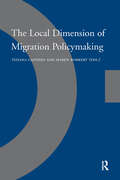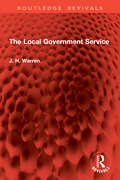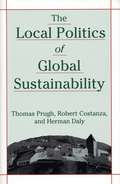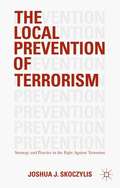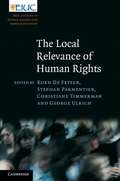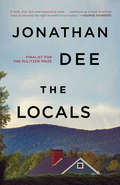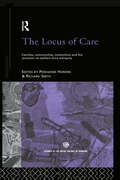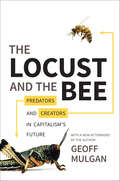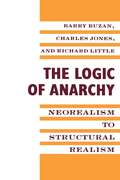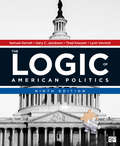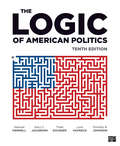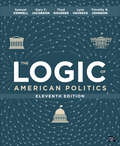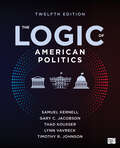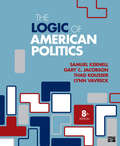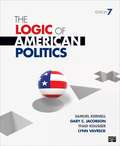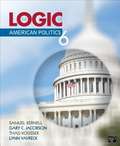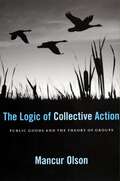- Table View
- List View
The Local Dimension of Migration Policymaking (IMISCOE Reports)
by Tiziana Caponio Maren BorkertThis book prompts a fresh look on immigrant integration policy. Revealing just where immigrants and their receiving societies interact everyday, it shows how societal inclusion is administered and produced at a local level. The studies presented focus on three issue areas of migration policy – citizenship, welfare services and religious diversity – and consider cities in very different national contexts. Spanning Switzerland, Italy, Germany, the Netherlands and Canada, the cases display great variety in their theoretical and methodological approaches. In all the countries considered, we see that the local level has an undeniable relevance despite differences in state structures, models of integration and centre-peripheral relations. Particularly for future migration policy research, such a complex comparative exercise thus yields an important universal realisation: the local dimension of migration policymaking matters.
The Local Government Service (Routledge Revivals)
by J. H. WarrenFirst Published in 1952, The Local Government Service describes in general terms the character and extent of the tasks which the body of public servants employed by the local authorities is called upon to perform. Part I comprises a general survey; Part II studies in greater detail the character and work of the agencies which are shaping the service - the organizations of employers and staff, the Whitley machinery, and the local authority in its capacity as an individual employer; while Part III deals with the more important aspects and issues of qualification and training in a way which could not have been attempted in part I without impeding the narrative.This is a must read for students of public administration and political science.
The Local Politics of Global Sustainability
by Robert Costanza Herman E. Daly Thomas PrughThe most difficult questions of sustainability are not about technology; they are about values. Answers to such questions cannot be found by asking the "experts," but can only be resolved in the political arena. In The Local Politics of Global Sustainability, author Thomas Prugh, with Robert Costanza and Herman Daly, two ofthe leading thinkers in the field of ecological economics, explore the kind of politics that can help enable us to achieve a sustainable world of our choice, rather than one imposed by external forces.The authors begin by considering the biophysical and economic dimensions of the environmental crisis, and tracing the crisis in political discourse and our public lives to its roots. They then offer an in-depth examination of the elements of a re-energized political system that could lead to the development of more sustainable communities. Based on a type of self-governance that political scientist Benjamin Barber calls "strong democracy," the politics is one of engagement rather than consignment, empowering citizens by directly involving them in community decisionmaking. After describing how it should work, the authors provide examples of communities that are experimenting with various features of strong democratic systems.The Local Politics of Global Sustainability explains in engaging, accessible prose the crucial biophysical, economic, and social issues involved with achieving sustainability. It offers a readable exploration of the political implications of ecological economics and will be an essential work for anyone involved in that field, as well as for students and scholars in environmental politics and policy, and anyone concerned with the theory and practical applications of the concept of sustainable development.
The Local Prevention of Terrorism: Strategy And Practice In The Fight Against Terrorism
by Joshua SkoczylisThis book explores the success and failures of the Prevent strategy, which was developed by the UK Government to help stop people becoming terrorists or supporting terrorism. It provides a holistic overview of the policy's formation, delivery and impact on Muslim communities.
The Local Relevance of Human Rights
by George Ulrich Koen De Feyter Stephan Parmentier Christiane TimmermanDo human rights offer real protection when disadvantaged groups invoke them at the local level in an attempt to improve their living conditions? If so, how can we make sure that the experiences of those invoking human rights at the local level have an impact on the further development of human rights (at national and other levels) so that the local relevance of human rights increases? Since the adoption of the Universal Declaration of Human Rights (UDHR) on 10 December 1948, numerous international documents have reaffirmed human rights as global norms. This book examines what factors determine whether appeals to human rights that emanate from the local level are successful, and whether the UDHR adequately responds to threats as currently defined by relevant groups or whether a revision of some of the ideas included in the UDHR is needed in order to increase its contemporary relevance.
The Locals: A Novel
by Jonathan Dee“Summons up a small American town at precisely the right moment in our history . . . a bold, vital, and view-expanding novel.”—George SaundersA rural working-class New England town elects as its mayor a New York hedge fund millionaire in this inspired novel for our times—fiction in the tradition of Jonathan Franzen and Jennifer Egan. Mark Firth is a contractor and home restorer in Howland, Massachusetts, who feels opportunity passing his family by. After being swindled by a financial advisor, what future can Mark promise his wife, Karen, and their young daughter, Haley? He finds himself envying the wealthy weekenders in his community whose houses sit empty all winter. Philip Hadi used to be one of these people. But in the nervous days after 9/11 he flees New York and hires Mark to turn his Howland home into a year-round “secure location” from which he can manage billions of dollars of other people’s money. The collision of these two men’s very different worlds—rural vs. urban, middle class vs. wealthy—is the engine of Jonathan Dee’s powerful new novel. Inspired by Hadi, Mark looks around for a surefire investment: the mid-decade housing boom. Over Karen’s objections, and teaming up with his troubled brother, Gerry, Mark starts buying up local property with cheap debt. Then the town’s first selectman dies suddenly, and Hadi volunteers for office. He soon begins subtly transforming Howland in his image—with unexpected results for Mark and his extended family. Here are the dramas of twenty-first-century America—rising inequality, working class decline, a new authoritarianism—played out in the classic setting of some of our greatest novels: the small town. The Locals is that rare work of fiction capable of capturing a fraught American moment in real time. Advance praise for The Locals“The residents of a small town in the Berkshires have their world overturned by a billionaire in their midst. . . . [The Locals] plays both as political allegory and kaleidoscopic character study. An absorbing panorama of small-town life and a study of democracy in miniature.”—Kirkus Reviews (starred review)“Good old social novels are hard to come by these days, great ones harder still. Leave it to [Jonathan] Dee to fill the void with a book that’s not only great but so frighteningly timely that the reader will be forced to wonder how he managed to compose it before the last election cycle.”—Booklist (starred review) “Engrossing . . . His blue-collar characters, each of them pursuing the American Dream, are vividly developed, and his insights into how they think about the government (ineffective and corrupt) and their rights as citizens (ignored, trampled) are timely. . . . [Dee] handles the plot with admirable skill, finding empathy for his bewildered characters. He creates tension as a reckoning day arrives, and strikes the perfect ending note.”—Publishers Weekly (starred review)
The Lockerbie Bombing: A Father's Search for Justice
by Jim Swire Peter BiddulphA father details his loss, grief, and fight for the truth following his daughter’s death in the 1988 bombing of Pan Am Flight 103.The destruction of Pan Am Flight 103 over the Scottish town of Lockerbie in December 1988 was the largest attack on Britain since World War II. 259 passengers and 11 townsfolk of Lockerbie were murdered. Libyan Abdelbaset al-Megrahi was convicted of the crime. He maintained his innocence until his death in 2012. Among the passengers was Flora, beloved daughter of Dr Jim Swire. Jim accepted American claims that Libya was responsible, but during the Lockerbie Trial he began to distrust key witnesses and supposed firm evidence. Since then, it has been revealed that the United States paid millions of dollars to two central identification witnesses, and the only forensic evidence central to the prosecution has been discredited. The book takes us along Dr. Swire’s journey as his initial grief and loss becomes a campaign to uncover the truth behind not only a personal tragedy but one of the modern world’s most shocking events.Praise for The Lockerbie Bombing“It is hard to read this book without concluding that Dr Swire is right, and that for reasons that are both understandable and shameful, successive British governments repeated obstructed the investigation and they did so at the instigation of our American allies. . . . This book recounts Swire’s long and painful search for the truth about Lockerbie and his version is persuasive. It is disturbing too because, if he has it right, the Scottish judges who have now three times rejected appeals against the original verdict, have made it hard to have confidence in the integrity of our law.” —The Scotsman“Fascinating, compelling—a book about international intrigue, personal feelings, and ethics. Right at its heart is the search for truth.” —Kate Adie“Lockerbie's heartrending epitaph. . . . A shattering tale of grief and love.” —Daily Mail
The Locus of Care: Families, Communities, Institutions, and the Provision of Welfare Since Antiquity (Routledge Studies in the Social History of Medicine)
by Peregrine Horden and Richard SmithThe care of the needy and the sick is delivered by various groups including immediate family, the wider community, religious organisations and the State funded institutions. The Locus of Care provides an historical perspective on welfare detailing who carers were in the past, where care was provided, and how far the boundary between family and state or informal and organised institutions have changed over time. Eleven international contributors provide a wide-ranging examination of themes, such as child care, mental health, and provision for the elderly and question the idea that there has been a recent evolutionary shift from informal provision to institutional care. Chapters on Europe and England use case studies and link evidence from ancient and medieval periods to contemporary problems and the recent past, whilst studies on China and South Africa look to the future of welfare throughout the world. By placing welfare in its historical, social, cultural and demographic contexts, Locus of Care reassesses community and institutional care and the future expectations of welfare provision.
The Locust and the Bee: Predators and Creators in Capitalism's Future
by Geoff MulganHow to harness capitalism's dynamism to create an economy that promotes well-being and rewards creationThe recent economic crisis was a dramatic reminder that capitalism can both produce and destroy. It's a system that by its very nature encourages predators and creators, locusts and bees. But, as Geoff Mulgan argues in this compelling, imaginative, and important book, the economic crisis also presents a historic opportunity to choose a radically different future for capitalism, one that maximizes its creative power and minimizes its destructive force.In an engaging and wide-ranging argument, Mulgan digs into the history of capitalism across the world to show its animating ideas, its utopias and dystopias, as well as its contradictions and possibilities. Drawing on a subtle framework for understanding systemic change, he shows how new political settlements reshaped capitalism in the past and are likely to do so in the future. By reconnecting value to real-life ideas of growth, he argues, efficiency and entrepreneurship can be harnessed to promote better lives and relationships rather than just a growth in the quantity of material consumption. Healthcare, education, and green industries are already becoming dominant sectors in the wealthier economies, and the fields of social innovation, enterprise, and investment are rapidly moving into the mainstream—all indicators of how capital could be made more of a servant and less a master.This is a book for anyone who wonders where capitalism might be heading next—and who wants to help make sure that its future avoids the mistakes of the past. This edition of The Locust and the Bee includes a new afterword in which the author lays out some of the key challenges facing capitalism in the twenty-first century.
The Lofts of SoHo: Gentrification, Art, and Industry in New York, 1950–1980
by Aaron ShkudaAmerican cities entered a new phase when, beginning in the 1950s, artists and developers looked upon a decaying industrial zone in Lower Manhattan and saw, not blight, but opportunity: cheap rents, lax regulation, and wide open spaces. Thus, SoHo was born. From 1960 to 1980, residents transformed the industrial neighborhood into an artist district, creating the conditions under which it evolved into an upper-income, gentrified area. Introducing the idea--still potent in city planning today--that art could be harnessed to drive municipal prosperity, SoHo was the forerunner of gentrified districts in cities nationwide, spawning the notion of the creative class. In The Lofts of SoHo, Aaron Shkuda studies the transition of the district from industrial space to artists' enclave to affluent residential area, focusing on the legacy of urban renewal in and around SoHo and the growth of artist-led redevelopment. Shkuda explores conflicts between residents and property owners and analyzes the city's embrace of the once-illegal loft conversion as an urban development strategy. As Shkuda explains, artists eventually lost control of SoHo's development, but over several decades they nonetheless forced scholars, policymakers, and the general public to take them seriously as critical actors in the twentieth-century American city.
The Logic Of Anarchy: Neorealism To Structural Realism (New Directions In World Politics Ser.)
by Barry Buzan Charles Jones Richard LittleThis book began to take life in 1986, when Barry Buzan proposed to the others a collective volume that would try to extend the existing framework of Neorealist theory. Before that it had simply been a set of attractions, dissatisfactions, and questions in Buzan’s mind arising from his encounter with Waltz’s work while preparing the 1983 book People, States and Fear. After that it became a genuinely joint project, with an agreed division of labor, and extensive comment and cross fertilization between the drafts.
The Logic and Limits of Political Reform in China
by Joseph FewsmithIn the 1990s China embarked on a series of political reforms intended to increase, however modestly, political participation to reduce the abuse of power by local officials. Although there was initial progress, these reforms have largely stalled and, in many cases, gone backward. If there were sufficient incentives to inaugurate reform, why wasn't there enough momentum to continue and deepen them? This book approaches this question by looking at a number of promising reforms, understanding the incentives of officials at different levels, and the way the Chinese Communist Party operates at the local level. The short answer is that the sort of reforms necessary to make local officials more responsible to the citizens they govern cut too deeply into the organizational structure of the party.
The Logic of American Politics
by Gary C. Jacobson Lynn Vavreck Thad Kousser Samuel H. KernellWhy does the American political system work the way it does? Find the answers in The Logic of American Politics. This best-selling text arms you with a toolkit of institutional design concepts—command, veto, agenda control, voting rules, and delegation—that help you recognize how the American political system was designed and why it works the way it does. The authors build your critical thinking through a simple yet powerful idea: politics is about solving collective action problems. Thoroughly updated to account for the most recent events and data, the Ninth Edition explores the increase in political polarization, the growing emotional involvement people have to politics, Americans’ reactions to changing demographics, the partisan politics of judicial selection, and the changing nature of presidential leadership. Revised to include the 2018 election results and analysis, this edition provides you with the tools you need to make sense of today’s government.
The Logic of American Politics
by Gary C. Jacobson Lynn Vavreck Thad Kousser Samuel H. KernellWhy does the American political system work the way it does? Find the answers in The Logic of American Politics. This best-selling text arms you with a toolkit of institutional design concepts—command, veto, agenda control, voting rules, and delegation—that help you recognize how the American political system was designed and why it works the way it does. The authors build your critical thinking through a simple yet powerful idea: politics is about solving collective action problems. Thoroughly updated to account for the most recent events and data, the Ninth Edition explores the increase in political polarization, the growing emotional involvement people have to politics, Americans’ reactions to changing demographics, the partisan politics of judicial selection, and the changing nature of presidential leadership. Revised to include the 2018 election results and analysis, this edition provides you with the tools you need to make sense of today’s government.
The Logic of American Politics
by Gary C. Jacobson Timothy R. Johnson Lynn Vavreck Thad Kousser Samuel H. KernellWhy does the American political system work the way it does? Find the answers in The Logic of American Politics. This bestselling text arms students with a "toolkit" of institutional design concepts—command, veto, agenda control, voting rules, and delegation—to help them comprehend how the American political system was designed and why it works the way it does. The authors build students′ critical thinking through a simple yet powerful idea: politics is about solving collective action problems. This thoroughly updated Tenth Edition considers the most recent events and data, including rising political polarization, the country’s reaction to changing demographics, and Americans’ growing emotional involvement in politics. With a fresh analysis of the 2020 election results, this bestseller provides students the tools they need to make sense of the government they have. This title is accompanied by a complete teaching and learning package. Contact your SAGE representative to request a demo. Digital Option / Courseware SAGE Vantage is an intuitive digital platform that delivers this text’s content and course materials in a learning experience that offers auto-graded assignments and interactive multimedia tools, all carefully designed to ignite student engagement and drive critical thinking. Built with you and your students in mind, it offers simple course set-up and enables students to better prepare for class. Learn more. Assignable Video with Assessment Assignable video (available with SAGE Vantage) is tied to learning objectives and curated exclusively for this text to bring concepts to life. Watch a sample video now. LMS Cartridge (formerly known as SAGE Coursepacks): Import this title’s instructor resources into your school’s learning management system (LMS) and save time. Don’t use an LMS? You can still access all of the same online resources for this title via the password-protected Instructor Resource Site. Learn more. CQ Press Lecture Spark: Designed to save you time and ignite student engagement, these free weekly lecture launchers focus on current event topics tied to key concepts in American Government. Access this week’s topic.
The Logic of American Politics
by Gary C. Jacobson Timothy R. Johnson Lynn Vavreck Thad Kousser Samuel H. KernellWhy does the American political system work the way it does? Find the answers in The Logic of American Politics. This bestselling text arms students with a "toolkit" of institutional design concepts—command, veto, agenda control, voting rules, and delegation—to help them comprehend how the American political system was designed and why it works the way it does. The authors build students′ critical thinking through a simple yet powerful idea: politics is about solving collective action problems. This thoroughly updated Tenth Edition considers the most recent events and data, including rising political polarization, the country’s reaction to changing demographics, and Americans’ growing emotional involvement in politics. With a fresh analysis of the 2020 election results, this bestseller provides students the tools they need to make sense of the government they have. This title is accompanied by a complete teaching and learning package. Contact your SAGE representative to request a demo. Digital Option / Courseware SAGE Vantage is an intuitive digital platform that delivers this text’s content and course materials in a learning experience that offers auto-graded assignments and interactive multimedia tools, all carefully designed to ignite student engagement and drive critical thinking. Built with you and your students in mind, it offers simple course set-up and enables students to better prepare for class. Learn more. Assignable Video with Assessment Assignable video (available with SAGE Vantage) is tied to learning objectives and curated exclusively for this text to bring concepts to life. Watch a sample video now. LMS Cartridge (formerly known as SAGE Coursepacks): Import this title’s instructor resources into your school’s learning management system (LMS) and save time. Don’t use an LMS? You can still access all of the same online resources for this title via the password-protected Instructor Resource Site. Learn more. CQ Press Lecture Spark: Designed to save you time and ignite student engagement, these free weekly lecture launchers focus on current event topics tied to key concepts in American Government. Access this week’s topic.
The Logic of American Politics
by Gary C. Jacobson Timothy R. Johnson Lynn Vavreck Thad Kousser Samuel H. KernellWhy does the American political system work the way it does? After observing the strains of intense partisanship and divided government, many Americans are wondering what logic, if any, can be found in politics. With both sides of the political spectrum being so different from one another and the scales often tipping in the favor of the opposing party by a fraction of a percentage point, how can anyone work the system to their advantage? With fresh analysis of the 2022 midterm election results, the Eleventh Edition of bestselling textbook The Logic of American Politics provides students with the tools they need to make sense of our government today. Weaving together historical context, contemporary politics, and a "toolkit" of institutional design concepts, the authors build an understanding of political institutions and practices as imperfect solutions to collective action problems. This title is accompanied by a complete teaching and learning package. Contact your SAGE representative to request a demo. Learning Platform / Courseware SAGE Vantage is an intuitive learning platform that integrates quality SAGE textbook content with assignable multimedia activities and auto-graded assessments to drive student engagement and ensure accountability. Unparalleled in its ease of use and built for dynamic teaching and learning, Vantage offers customizable LMS integration and best-in-class support. It’s a learning platform you, and your students, will actually love. Learn more. Assignable Video with Assessment Assignable video (available in SAGE Vantage) is tied to learning objectives and curated exclusively for this text to bring concepts to life. Watch a sample video now. LMS Cartridge: Import this title’s instructor resources into your school’s learning management system (LMS) and save time. Don’t use an LMS? You can still access all of the same online resources for this title via the password-protected Instructor Resource Site. Learn more.
The Logic of American Politics
by Gary C. Jacobson Timothy R. Johnson Lynn Vavreck Thad Kousser Samuel H. KernellWhy does the American political system work the way it does? After observing the strains of intense partisanship and divided government, many Americans are wondering what logic, if any, can be found in politics. With both sides of the political spectrum being so different from one another and the scales often tipping in the favor of the opposing party by a fraction of a percentage point, how can anyone work the system to their advantage? With fresh analysis of the 2022 midterm election results, the Eleventh Edition of bestselling textbook The Logic of American Politics provides students with the tools they need to make sense of our government today. Weaving together historical context, contemporary politics, and a "toolkit" of institutional design concepts, the authors build an understanding of political institutions and practices as imperfect solutions to collective action problems. This title is accompanied by a complete teaching and learning package. Contact your SAGE representative to request a demo. Learning Platform / Courseware SAGE Vantage is an intuitive learning platform that integrates quality SAGE textbook content with assignable multimedia activities and auto-graded assessments to drive student engagement and ensure accountability. Unparalleled in its ease of use and built for dynamic teaching and learning, Vantage offers customizable LMS integration and best-in-class support. It’s a learning platform you, and your students, will actually love. Learn more. Assignable Video with Assessment Assignable video (available in SAGE Vantage) is tied to learning objectives and curated exclusively for this text to bring concepts to life. Watch a sample video now. LMS Cartridge: Import this title’s instructor resources into your school’s learning management system (LMS) and save time. Don’t use an LMS? You can still access all of the same online resources for this title via the password-protected Instructor Resource Site. Learn more.
The Logic of American Politics
by Gary C. Jacobson Timothy R. Johnson Lynn Vavreck Thad Kousser Samuel H. KernellWhy does the American political system work the way it does? After observing the strains of intense partisanship and divided government, many Americans are wondering what logic, if any, can be found in politics. With both sides of the political spectrum being so different from one another and the scales often tipping in the favor of the opposing party by a fraction of a percentage point, how can anyone work the system to their advantage? With fresh analysis of the 2024 presidential election results, the bestselling textbook The Logic of American Politics provides students with the tools they need to make sense of the government they have. Weaving together historical context, contemporary politics, and a "toolkit" of institutional design concepts, the Twelfth Edition builds students′ understanding of political institutions and practices as imperfect solutions to collective action problems. This text is offered in Sage Vantage, an intuitive learning platform that integrates quality Sage textbook content with assignable multimedia activities and auto-graded assessments to drive student engagement and ensure accountability. Unparalleled in its ease of use and built for dynamic teaching and learning, Vantage offers customizable LMS integration and best-in-class support. Instructors, see how Vantage works! Take a brief self-guided tour with our interactive demo
The Logic of American Politics
by Gary C. Jacobson Timothy R. Johnson Lynn Vavreck Thad Kousser Samuel H. KernellWhy does the American political system work the way it does? After observing the strains of intense partisanship and divided government, many Americans are wondering what logic, if any, can be found in politics. With both sides of the political spectrum being so different from one another and the scales often tipping in the favor of the opposing party by a fraction of a percentage point, how can anyone work the system to their advantage? With fresh analysis of the 2024 presidential election results, the bestselling textbook The Logic of American Politics provides students with the tools they need to make sense of the government they have. Weaving together historical context, contemporary politics, and a "toolkit" of institutional design concepts, the Twelfth Edition builds students′ understanding of political institutions and practices as imperfect solutions to collective action problems. This text is offered in Sage Vantage, an intuitive learning platform that integrates quality Sage textbook content with assignable multimedia activities and auto-graded assessments to drive student engagement and ensure accountability. Unparalleled in its ease of use and built for dynamic teaching and learning, Vantage offers customizable LMS integration and best-in-class support. Instructors, see how Vantage works! Take a brief self-guided tour with our interactive demo
The Logic of American Politics (Logic of American Politics)
by Gary C. Jacobson Lynn Vavreck Samuel H. Kernell Thaddeus Benjamin KousserThis new edition of the bestselling The Logic of American Politics is thoroughly updated and covers the dramatic 2016 election results with a thorough analysis of those results. It arms students with a revised introduction to institutional design that makes concepts such as command, veto, agenda control, voting rules, and delegation easier for students to master and apply, so they clearly see how the American political system was devised and why it works the way it does. Authors Samuel Kernell, Gary C. Jacobson, Thad Kousser, and Lynn Vavreck build students' critical thinking through a simple yet powerful idea: politics is about solving collective action problems. This new edition continues to delve into partisan differences among voters and in government and highlight the increasingly partisan nature of campaigns. By exploring issues such as the Affordable Care Act’s troubled implementation, the increasing legalization of marijuana and same-sex marriage in the states, and the debate over immigration, the book illustrates how the institutional structures of government, federalism, and even campaigns can help voters make sense of their choices. The concluding chapter on policymaking examines the noticeable logic that guides American policy, as shown through issues like health care reform, global climate change, and the federal budget. Students glean insights into the sources of policy problems, identify possible solutions, and realize why agreement on those solutions is often so hard to achieve.
The Logic of American Politics (Logic of American Politics)
by Gary C. Jacobson Lynn Vavreck Thad Kousser Samuel H. KernellThis new edition of the bestselling The Logic of American Politics is thoroughly updated and covers the dramatic 2016 election results with a thorough analysis of those results. It arms students with a revised introduction to institutional design that makes concepts such as command, veto, agenda control, voting rules, and delegation easier for students to master and apply, so they clearly see how the American political system was devised and why it works the way it does. Authors Samuel Kernell, Gary C. Jacobson, Thad Kousser, and Lynn Vavreck build students' critical thinking through a simple yet powerful idea: politics is about solving collective action problems. This new edition continues to delve into partisan differences among voters and in government and highlight the increasingly partisan nature of campaigns. By exploring issues such as the Affordable Care Act’s troubled implementation, the increasing legalization of marijuana and same-sex marriage in the states, and the debate over immigration, the book illustrates how the institutional structures of government, federalism, and even campaigns can help voters make sense of their choices. The concluding chapter on policymaking examines the noticeable logic that guides American policy, as shown through issues like health care reform, global climate change, and the federal budget. Students glean insights into the sources of policy problems, identify possible solutions, and realize why agreement on those solutions is often so hard to achieve.
The Logic of American Politics (Seventh Edition)
by Gary C. Jacobson Samuel Kernell Thad Kousser Lynn Vavregk"The Logic of American Politics helps students understand the forces that have created conditions like partisan polarization, divided government, and judicial intervention and to see how they shape the choices of political leaders today. Part I covers the foundational elements of American politics; Part II examines the major formal institutions of national government; and Part III analyzes the institutions that link citizens with government officials in terms of their historical development, political logic, and present-day operations. "
The Logic of American Politics, 6th Edition
by Gary C. Jacobson Samuel Kernell Lynn Vavreck Thad KousserAfter observing the strains of intense partisanship and divided government, many Americans are wondering what logic, if any, can be found in politics. The new Sixth Edition of The Logic of American Politics reaffirms this best-seller's place as the most accessible "smart" book on the market. Consistently praised for its engaging narrative, the book hooks students with great storytelling while arming them with a "toolkit" of institutional design concepts-command, veto, agenda control, voting rules, delegation.
The Logic of Collective Action
by Mancur OlsonThis book develops an original theory of group and organizational behavior that cuts across disciplinary lines and illustrates the theory with empirical and historical studies of particular organizations. Applying economic analysis to the subjects of the political scientist, sociologist, and economist, Mr. Olson examines the extent to which the individuals that share a common interest find it in their individual interest to bear the costs of the organizational effort. The theory shows that most organizations produce what the economist calls "public goods"--goods or services that are available to every member, whether or not he has borne any of the costs of providing them. Economists have long understood that defense, law and order were public goods that could not be marketed to individuals, and that taxation was necessary. They have not, however, taken account of the fact that private as well as governmental organizations produce public goods. The services the labor union provides for the worker it represents, or the benefits a lobby obtains for the group it represents, are public goods: they automatically go to every individual in the group, whether or not he helped bear the costs. It follows that, just as governments require compulsory taxation, many large private organizations require special (and sometimes coercive) devices to obtain the resources they need. This is not true of smaller organizations for, as this book shows, small and large organizations support themselves in entirely different ways. The theory indicates that, though small groups can act to further their interest much more easily than large ones, they will tend to devote too few resources to the satisfaction of their common interests, and that there is a surprising tendency for the "lesser" members of the small group to exploit the "greater" members by making them bear a disproportionate share of the burden of any group action. All of the theory in the book is in Chapter 1; the remaining chapters contain empirical and historical evidence of the theory's relevance to labor unions, pressure groups, corporations, and Marxian class action.
